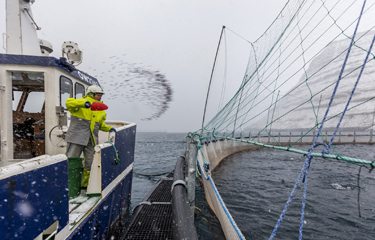Biological problems caused Bakkafrost Group to see losses in the fourth quarter of 2021. But a record harvest and high prices helped the company post improvements on its operational earnings before interest and taxes (EBIT) in the fourth-quarter.
Glyvrar, Faroe Islands-based Bakkafrost Group delivered a higher total operational EBIT of DKK 120 million (USD 18.3 million, EUR 16.1 million) in Q4 2021, up from DKK 89 million (USD 13.6 million, EUR 12 million) in the corresponding period of 2020, helped by a record 20,700-metric-ton (MT) harvest from its Faroese farming operations.
The group saw losses in Q4 2021 of DKK 3 million (USD 457,822, EUR 403,223), an improvement on the loss of DKK 38 million (USD 5.8 million, EUR 5.1 million) posted in Q4 2020. Its operating revenue increased from DKK 1.1 billion (USD 167.9 million, EUR 147.9 million) to almost DKK 1.5 billion (USD 228.9 million, EUR 201.6 million).
Bakkafrost CEO Regin Jacobsen said that the results in closing quarter of last year were negatively affected by a continuation of the biological issues the salmon producer reported in the previous quarter. But he said mortality levels have now “normalized.”
“In the Faroe Islands, we are pleased to have reached record-high harvesting volumes in the fourth quarter and for the full-year. Despite some challenges we are excited to see record low feed-conversion rates and record-high weight on transferred smolt. Our feed operation also sold very high volumes in both the fourth quarter and for the full-year,” Jacobsen said. “We are convinced that our strategy and investments will reduce the biological risk by ensuring stronger biology, which is crucial to maintain a competitive operation.”
Jacobsen said the global salmon market is currently very strong, with increasing demand from all segmentsseen in the fourth quarter, which in turn led to higher prices.
“Compared to same quarter last year, the salmon prices increased around 37 percent in this quarter, despite higher volumes sold. Looking ahead, the market situation seems very bullish, with tight supply and markets normalizing after COVID-19,” he said.
In total, the group harvested 25,800 MT of gutted-weight salmon in the fourth quarter, with 5,100 MT coming from Scotland. For 2021 as a whole, Bakkafrost harvested 97,900 MT - up from 86,700 MT in 2020 - with 67,200 MT from the Faroes, and Scotland contributing 29,700 MT.
Bakkafrost has forecast a 2022 harvest of 103,000 MT gutted-weight, with 68,000 MT coming from the Faroe Islands and 35,000 MT from Scotland.
It also expects to release around 14.9 million smolts of around 500 grams in the Faroe Islands in 2022, compared to 14.4 million smolts in 2021, 14.3 million smolts in 2020, 12.7 million smolts in 2019 and 12.6 million smolts in 2018. The smolt release in Scotland is expected to be 10.8 million smolts of around 120 grams, compared to 11.1 million smolts in 2021, 10.4 million smolts in 2020, 12.4 million smolts in 2019, and 8.6 million smolts in 2018.
According to its Q4 earnings report, Bakkafrost’s Farming Islands (FO) segment achieved an operational EBIT of DKK 282 million (USD 43 million, EUR 37.9 million) in the three-month period, up from DKK 63 million (USD 9.6 million, EUR 8.5 million) in the corresponding period of 2020. This equated to DKK 13.64 (USD 2.08, EUR 1.83) per kilogram. For 2021, FO’s operational EBIT was DKK 903.8 million (USD 138 million, EUR 121.5 million), which was almost double of that posted for 2020.
Its Farming Scotland (SCT) segment saw operational losses, with its operational EBIT seeing a loss of DKK 213.8 million (USD 32.6 million, EUR 28.7 million) in Q4, and DKK 249.5 million (USD 38.1 million, EUR 33.5 million) for the year as a whole.
Bakkafrost's VAP (value-added products) segment posted an operational EBIT of DKK 28.1 million (USD 4.3 million, EUR 3.8 million) for the fourth quarter, down from DKK 80.1 million (USD 12.2 million, EUR 10.8 million). For the full-year, it fell 14 percent to DKK 119.5 million (USD 18.2 million, EUR 16.2 million).
Bakkafrost's Fishmeal, Oil and Feed (FOF) unit increased its Q4 revenue by 21 percent to DKK 433.5 million (USD 66.2 million, EUR 58.3 million), and its earnings before interest, taxes, depreciation and amortization (EBITDA) climbed 86 percent to DKK 89.3 million (USD 13.6 million, EUR 12 million). For 2021 as a whole, FOF’s EBITDA increased 47 percent to DKK 306.2 million (USD 46.7 million, EUR 41.2 million). FOF produced 6,853 MT of fishmeal in the quarter, and 34,962 MT for the full-year. Fish oil production in Q4 and the full-year 2021 totaled 2,921 MT and 8,124 MT, respectively.
Bakkafrost said it expects its 2022 fishmeal and fish oil production to be on par with last year, while its subsidiary Havsbrún expects to sell 130,000 MT aquafeed.
Overall, for the full-year 2021, Bakkafrost achieved an operational EBIT of DKK 821.2 million (USD 125.3 million, EUR 110.4 million), up DKK 200 million (USD 30.5 million, EUR 26.9 million) from 2020. Its annual profit increased from DKK 462.8 million (USD 70.6 million, EUR 62.2 million) to DKK 964 million (USD 147.1 million, EUR 129.6 million).
Photo courtesy of Bakkafrost Group







